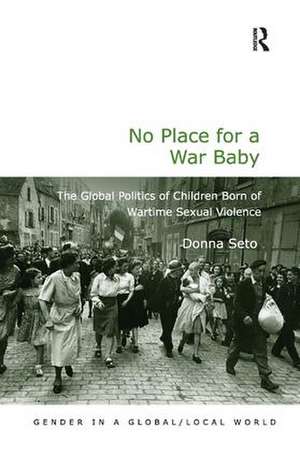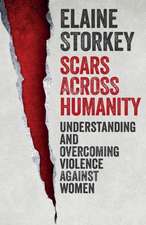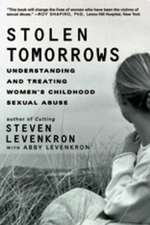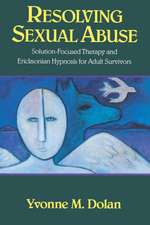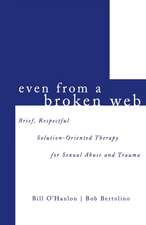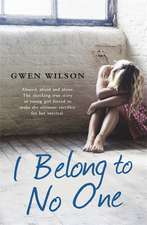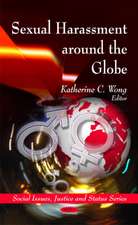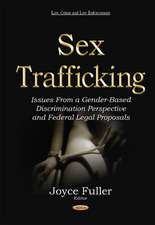No Place for a War Baby: The Global Politics of Children born of Wartime Sexual Violence: Gender in a Global/Local World
Autor Donna Setoen Limba Engleză Hardback – 28 mar 2013
| Toate formatele și edițiile | Preț | Express |
|---|---|---|
| Paperback (1) | 238.68 lei 6-8 săpt. | |
| Taylor & Francis – 30 iun 2020 | 238.68 lei 6-8 săpt. | |
| Hardback (1) | 1003.43 lei 6-8 săpt. | |
| Taylor & Francis – 28 mar 2013 | 1003.43 lei 6-8 săpt. |
Din seria Gender in a Global/Local World
- 9%
 Preț: 867.09 lei
Preț: 867.09 lei -
 Preț: 310.41 lei
Preț: 310.41 lei -
 Preț: 309.79 lei
Preț: 309.79 lei -
 Preț: 394.55 lei
Preț: 394.55 lei - 9%
 Preț: 935.52 lei
Preț: 935.52 lei -
 Preț: 480.62 lei
Preț: 480.62 lei -
 Preț: 467.44 lei
Preț: 467.44 lei - 25%
 Preț: 768.46 lei
Preț: 768.46 lei -
 Preț: 416.22 lei
Preț: 416.22 lei - 18%
 Preț: 1000.27 lei
Preț: 1000.27 lei - 25%
 Preț: 768.10 lei
Preț: 768.10 lei -
 Preț: 387.99 lei
Preț: 387.99 lei -
 Preț: 450.71 lei
Preț: 450.71 lei - 18%
 Preț: 1004.20 lei
Preț: 1004.20 lei -
 Preț: 329.88 lei
Preț: 329.88 lei - 18%
 Preț: 1000.27 lei
Preț: 1000.27 lei -
 Preț: 420.08 lei
Preț: 420.08 lei - 18%
 Preț: 998.71 lei
Preț: 998.71 lei - 18%
 Preț: 1109.99 lei
Preț: 1109.99 lei -
 Preț: 388.13 lei
Preț: 388.13 lei -
 Preț: 310.22 lei
Preț: 310.22 lei - 22%
 Preț: 324.16 lei
Preț: 324.16 lei - 18%
 Preț: 1006.60 lei
Preț: 1006.60 lei -
 Preț: 469.34 lei
Preț: 469.34 lei - 18%
 Preț: 1115.51 lei
Preț: 1115.51 lei - 15%
 Preț: 670.77 lei
Preț: 670.77 lei - 31%
 Preț: 765.77 lei
Preț: 765.77 lei - 18%
 Preț: 1113.12 lei
Preț: 1113.12 lei - 12%
 Preț: 325.34 lei
Preț: 325.34 lei -
 Preț: 412.03 lei
Preț: 412.03 lei -
 Preț: 416.44 lei
Preț: 416.44 lei -
 Preț: 389.66 lei
Preț: 389.66 lei - 25%
 Preț: 767.74 lei
Preț: 767.74 lei - 18%
 Preț: 1005.80 lei
Preț: 1005.80 lei - 26%
 Preț: 764.87 lei
Preț: 764.87 lei - 30%
 Preț: 768.46 lei
Preț: 768.46 lei - 18%
 Preț: 1000.27 lei
Preț: 1000.27 lei
Preț: 1003.43 lei
Preț vechi: 1223.70 lei
-18% Nou
Puncte Express: 1505
Preț estimativ în valută:
192.00€ • 201.04$ • 159.26£
192.00€ • 201.04$ • 159.26£
Carte tipărită la comandă
Livrare economică 10-24 aprilie
Preluare comenzi: 021 569.72.76
Specificații
ISBN-13: 9781409449232
ISBN-10: 1409449238
Pagini: 232
Ilustrații: Includes 3b&w illustrations
Dimensiuni: 156 x 234 x 22 mm
Greutate: 0.54 kg
Ediția:New ed.
Editura: Taylor & Francis
Colecția Routledge
Seria Gender in a Global/Local World
Locul publicării:Oxford, United Kingdom
ISBN-10: 1409449238
Pagini: 232
Ilustrații: Includes 3b&w illustrations
Dimensiuni: 156 x 234 x 22 mm
Greutate: 0.54 kg
Ediția:New ed.
Editura: Taylor & Francis
Colecția Routledge
Seria Gender in a Global/Local World
Locul publicării:Oxford, United Kingdom
Cuprins
No Place for a War Baby
Recenzii
’Feminist IR scholarship posits that much can be learnt from studying those actors seemingly most marginal to the high politics of war and security. Children born of wartime conflict symbolize both the complexity of conflict and the suffering that is engendered by conflict - and that is ongoing. International relations and human rights researchers and advocates have documented the pervasive use of sexual violence as a tactic of conflict but they have omitted to make visible the children who are born from this wartime rape. In this fascinating and compelling study, Donna Seto brings these missing children into our accounts of international relations, violence, and postconflict. In so doing, she models the responsibility of the scholar to attend to the exclusion and marginalization of subjects through research and critical analysis.’ Jacqui True, Monash University, Australia 'Through feminist and post-structural perspectives, No Place for a War Baby opens up a new space for studies on children born of wartime sex violence. This book is a pioneering work that deserves a wide readership, especially among academics, students, policy-makers and activists who are interested in international conflicts, feminism theories and human rights.' The Round Table '... more than most books on gender and international relations, this one will well serve a broad readership. For scholars, it will fill a gap in IR analysis generally and feminist IR work (where it will be most relevant) specifically. It outlines critical conceptual, theoretical, and empirical problems, while alerting scholars that traditional accounts of global politics routinely overlook children born of war rape. For policy makers, the book’s careful revelation of problems in children’s rights policy provides a good basis for reevaluating gender inequities in conflict mitigation and post-conflict reconstruction.' Michigan War Studies Review 'This book offers a significant review of the research evidenc
Descriere
Donna Seto investigates why children born of wartime sexual violence are rarely included in post-conflict processes of reconciliation and recovery. In considering this, Seto examines how the theories and practices of mainstream International Relations (IR) can silence the experiences of war rape survivors and children born of wartime sexual violence and explores the theoretical frameworks within IR and the institutional structures that uphold protection regimes for children and women.
